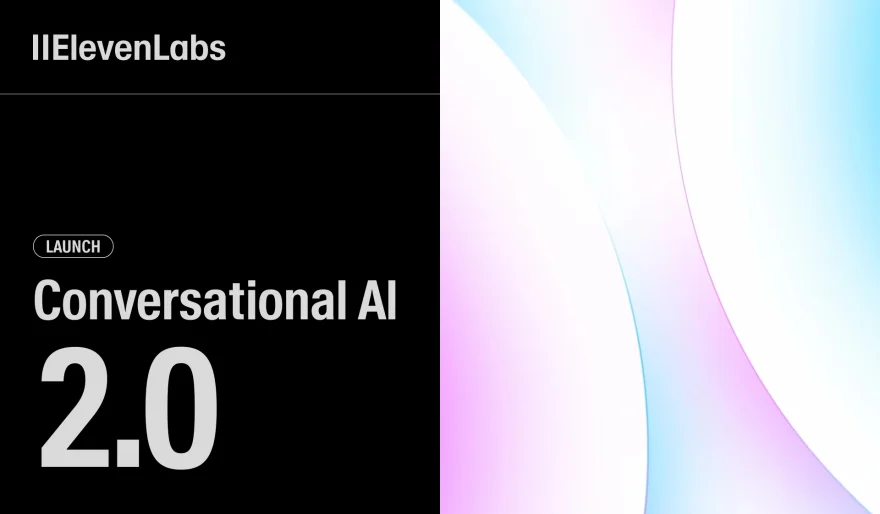Stay Ahead of the Curve
Latest AI news, expert analysis, bold opinions, and key trends — delivered to your inbox.
ElevenLabs Launches Conversational AI 2.0 — And It's a Major Upgrade
5 min read ElevenLabs just launched Conversational AI 2.0 — smarter turn-taking, voice + text input, real-time info retrieval, batch calling, multi-voice agents, and enterprise-grade features. It’s fast, scalable, and feels 100% human. June 02, 2025 14:44
On May 29, 2025, ElevenLabs officially rolled out Conversational AI 2.0, a massive upgrade to its voice agent platform—just four months after the original launch. Designed for enterprise-grade applications, the update focuses on more natural, intelligent, and secure AI-powered conversations across customer service, sales, healthcare, and more.
Here’s what’s new and why it matters:
Smarter Turn-Taking for More Human Conversations
The new turn-taking model detects real-time cues—like "um," "ah," or brief silences—to determine when to speak or wait. This eliminates awkward interruptions and makes AI responses feel fluid and human-like. Imagine a customer support agent that knows when you're thinking or searching for your password—that’s the goal.
Multimodal Input: Speak or Type Freely
Users can now switch between voice and text in a single interaction. This is perfect for moments when saying “E as in Echo” isn’t practical—like reading out an email or credit card number. It's all supported across ElevenLabs' HTML widget, SDKs, and WebSocket API.
Built-in RAG (Retrieval-Augmented Generation)
Voice agents can now pull real-time data from external knowledge bases—instantly and securely. Whether it’s product specs or medical guidelines, agents stay informed and accurate. Latency remains low, and privacy protections are strong.
Batch Calling at Scale
With batch calling, users can initiate hundreds of outbound voice calls at once. Useful for appointment reminders, surveys, or sales outreach. Each call can be personalized with dynamic variables and monitored in real-time.
Multi-Character Mode + Language Switching
AI agents can change voices or personas mid-conversation—ideal for storytelling, gaming, or dramatized customer interactions. The platform also supports automatic language detection, enabling seamless multilingual support.
Enterprise-Ready Infrastructure
With HIPAA compliance, EU data residency, and advanced security, ElevenLabs is fully equipped for sensitive sectors like healthcare. They also offer enterprise-level SLAs, dedicated support, unlimited seats, and bulk discounts.
Model Flexibility
Developers can use Claude, GPT, Gemini, or even plug in custom LLMs via server integration. Whether you're building a customer service agent or a gamified tutor, you can choose the best brain for the job.
Low Latency, High Scale
Conversational AI 2.0 is optimized for speed, with average latency under 200ms even during 100 simultaneous conversations. It can handle thousands of calls per day—ideal for large teams or high-traffic deployments.
Pricing & Plans
Here’s a snapshot of their latest plans:
| Plan | Price | Minutes | Concurrency | Notes |
|---|---|---|---|---|
| Free | $0/month | 15 | 4 | Requires attribution |
| Starter | $5/month | 50 | 6 | $0.12 per extra min |
| Creator | $11/month | 250 | 6 | Discounted from $22 |
| Pro | $99/month | 1,100 | 10 | $0.11 per extra min |
| Scale | $330/month | 3,600 | 20 | $0.10 per extra min |
| Business | $1,320/mo | 13,750 | 30 | $0.08 per extra min w/ volume discounts |
Use Cases
-
Customer Service: 24/7 multilingual support and troubleshooting
-
Virtual Assistants: Schedules, reminders, info lookups
-
Retail Support: Personalized recommendations and order tracking
-
Personalized Learning: One-on-one tutoring and reading assistance
-
Interactive Storytelling: Multi-voice dramatized experiences
Built for Developers
-
Full SDK and API support (Python, JavaScript, React, Swift)
-
WebSocket API for real-time customization
-
Silence optimization: inference cost drops to 5% during pauses >10s
-
Premade templates let devs launch agents in minutes
-
Custom analysis dashboards to track performance (e.g., conversions, resolution rates)
Feedback So Far
Users love the ultra-realistic voices, seamless flow, and fast setup. One developer said they built a working customer support flow in just 20 minutes. Others say the agents feel “100% human.”
Still, challenges remain. Some users report voice quality dips when handling numbers or dates in non-English contexts—e.g., "200,000 apples" read as "20 thousand thousand" or errors in Italian phrasing. ElevenLabs hasn’t addressed this yet but may improve support in future updates.
Market Competition
Conversational AI 2.0 puts ElevenLabs in direct competition with OpenAI’s Realtime API, Vapi, and Retell. ElevenLabs wins on voice variety, customizability, and latency—but some users still prefer OpenAI’s model for character voice adaptability and sound effects, despite its stricter guardrails.
One Final Note
Despite some online noise suggesting ElevenLabs was “falling behind,” the launch of Conversational AI 2.0 shows otherwise. With a rumored $3B+ valuation round in progress and clear momentum in product development, ElevenLabs is doubling down on the future of voice AI.



















 AI Agents
AI Agents